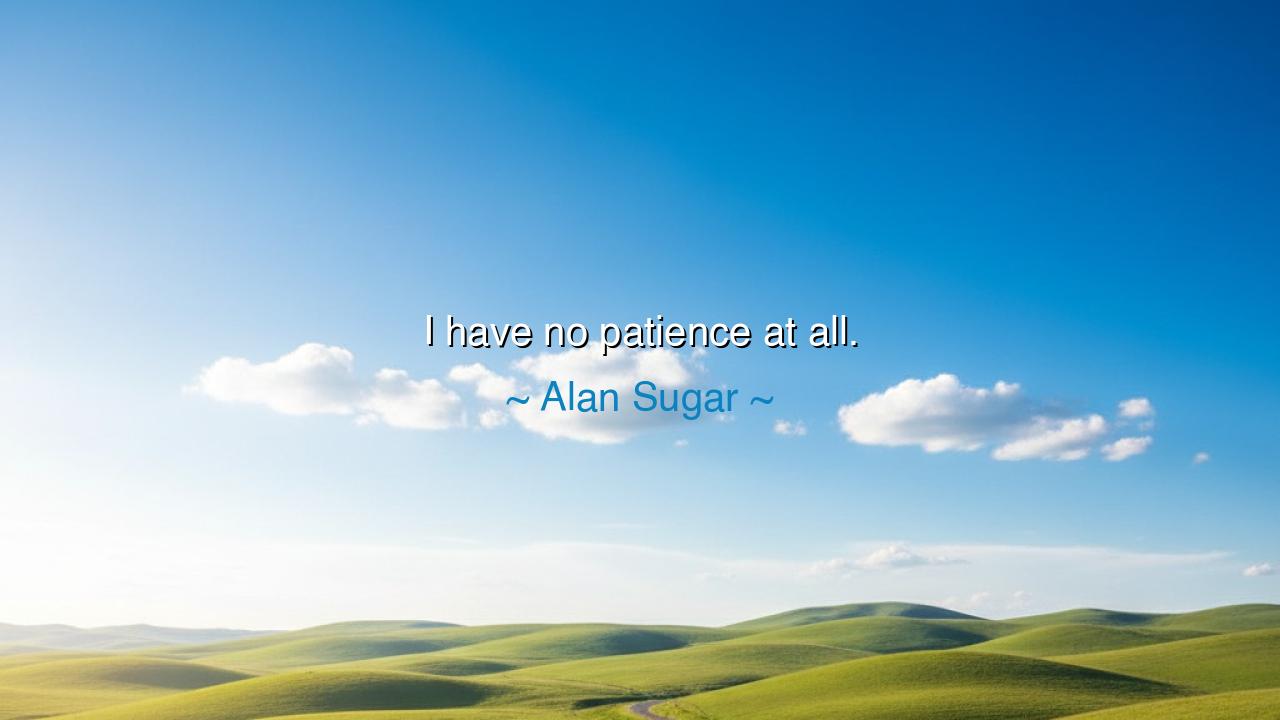
I have no patience at all.






Hear, O seekers of wisdom, the sharp and uncompromising words of Alan Sugar: “I have no patience at all.” At first they sound harsh, as though uttered by a heart made of iron, yet in them lies a fire of truth—born of the marketplace, forged in the furnace of business, where hesitation is defeat and delay is ruin. These words do not come from cruelty, but from the urgency of one who has walked among the storms of commerce, and who knows that fortune often favors the swift and decisive.
From the dawn of time, mankind has wrestled with the tension between patience and urgency. The farmer must wait for the harvest, but the warrior must strike without delay. The healer must endure long hours by the sickbed, but the captain must turn the ship before the storm swallows it whole. Lord Sugar’s words, born of his own trials as a trader and builder of enterprise, remind us that in the field of business, where moments are precious and competition fierce, delay can often mean defeat. To have “no patience” is, for him, not a flaw but a strategy—a way to cut through excuses, weakness, and indecision.
Consider the tale of Alexander the Great, who, when faced with the Gordian Knot—a tangled cord no man could unravel—did not waste his days tugging gently at the threads. He drew his sword and cleaved it in two. Some would call it rashness; others call it genius. It was not patience but boldness that gave him victory. So too with Sugar, who speaks not to praise slowness, but to champion decisive action when the hour demands it.
Yet beware, O children of time, for the sword of impatience cuts both ways. That which brings speed may also bring ruin if wielded without wisdom. Many a general has lost a battle through rash advance, many a ruler has destroyed a city through unchecked fury. Thus, when Alan Sugar says, “I have no patience,” we must hear both the strength and the shadow. His words are a beacon for those who hesitate endlessly, but also a warning for those who would act without reflection.
The meaning, then, is this: in the struggle of life, there are moments when patience is a virtue, and moments when it is a chain. To discern the difference is the true mark of wisdom. The impatient spirit may achieve much, for it refuses to linger in doubt or mediocrity. But the wise spirit balances urgency with foresight, lest its speed carry it into ruin.
The lesson for you, O listener, is to master your own measure of patience. In your labors, do not let excuses or fears paralyze you; act boldly, as Sugar urges. But temper your action with foresight, as the farmer tempers his harvest with time. Learn to ask: “Is this the hour to wait, or the hour to strike?” In this discernment lies power.
Practical steps stand before you: when opportunity knocks, do not delay with endless hesitation—seize it. When problems fester, do not let them linger—confront them swiftly. But when growth requires time, or healing needs rest, do not despise the slow path. Cultivate both urgency and endurance, and you shall not only avoid the weakness of inaction, but also the ruin of recklessness.
Thus, let Alan Sugar’s declaration ring in your ears as both challenge and reminder. To have “no patience” may drive you forward when others falter, but let your wisdom guide that fire, lest it consume you. Act boldly, live decisively, but know also when stillness has its place. For the balance of patience and action is the true art of mastery, and those who wield it shall carve their mark upon the ages.






AAdministratorAdministrator
Welcome, honored guests. Please leave a comment, we will respond soon